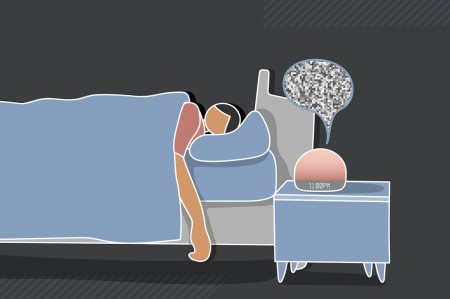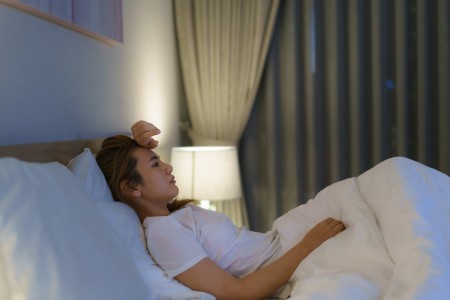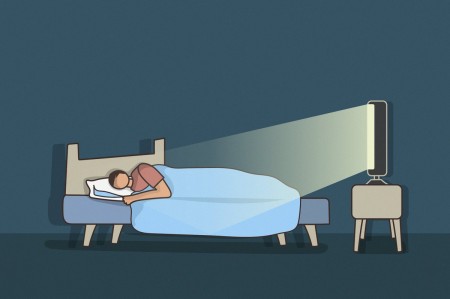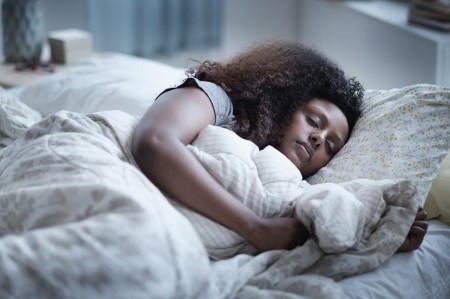
Advertisements
You've got your PJs on, teeth brushed and lights out. But then you get under the covers and...you can't fall asleep, no matter how hard you try. Whether it's stress, caffeine or noise, there are plenty of things that can keep you up at night. Luckily, though, there are also a few tricks to help you fall asleep fast.
Video of the Day
In general, adults should aim to get at least seven hours of sleep each night, per the Centers for Disease Control and Prevention. And falling asleep is the first part of that puzzle. Most people take between 5 and 20 minutes to fall asleep, according to the Cleveland Clinic. But things like anxiety or a bedroom that's too bright can extend sleep latency (the time it takes you to start snoozing).
Try these eight sleep-expert-approved methods to hit the hay without delay.
1. Get to Know Your Chronotype
Your chronotype is your body's natural inclination to sleep and be awake at certain times: Typically, you're either a morning type, evening type or neither.
Your chronotype is partly determined by genetics, but it can be modified by age, activity, your environment and the change of seasons, according to an October 2018 review in Nature of Science and Sleep.
And getting on a sleep schedule that suits your chronotype can benefit your snoozes. For instance, if your body intuitively rises when it gets light outside, consider adjusting your bedtime accordingly so you can get enough shut-eye before your natural wake-up.
"The reason [knowing your chronotype] is important is that by waking up at the same time each day, your body does two things: It turns off the melatonin faucet in your head, which stops the sleep process, and lowers brain fog," says Michael J. Breus, PhD, board-certified sleep specialist and clinical psychologist. "It also sets a timer for when melatonin should start the sleep process so you get in bed just as your brain is ready to sleep — this will speed up your sleep onset latency quite a bit."
Advertisements
On the flip side, adapting a sleep cycle that isn't in line with your natural rhythms can mess with your sleep quality and your ability to fall asleep, according to the National Sleep Foundation. And per the Cleveland Clinic, chronic lack of quality sleep can lead to physical and emotional issues such as:
- Impaired alertness
- Fatigue
- Irritability
- Mood swings
- Increased risk for high blood pressure, diabetes, heart attack, heart failure or stroke
Tip
While you may already know if you're a morning type, evening type or somewhere in between, there are assessments you can take for more insight into your chronotype, like this questionnaire from the University of Pennsylvania's Perelman School of Medicine.
2. Try a Power-Down Hour
A power-down hour helps you wrap up your day and get ready for sleep before bedtime. It helps your body decompress and sends the message that it will soon be time to drift off to dreamland, says holistic psychiatrist. Jodie Skillicorn, DO.
You can break up the hour into three 20-minute sessions in the following way:
- In the first 20 minutes, complete light, unfinished tasks like cleaning dishes or feeding a pet.
- In the second 20 minutes, do something to help you wind down, like journaling, talking to a friend or doing a relaxation technique (think: meditating, deep breathing, light yoga).
- In the last 20 minutes, focus on your personal hygiene by brushing your teeth or taking a warm bath or shower.
3. Practice Progressive Muscle Relaxation
Progressive muscle relaxation is a technique where you contract and then relax your muscles to release tension.
One way to try progressive muscle relaxation is by tensing and releasing the muscles in your toes and then slowly working your way up the rest of your body. Each time you squeeze your muscles, hold it for about five seconds, then relax for 30 seconds before moving to the next body part.
According to the Mayo Clinic, this and other relaxation techniques may help improve your sleep quality by encouraging the following changes in your body:
- Slowing your breathing rate
- Reducing activity of stress hormones
- Reducing muscle tension and chronic pain
- Lowering your blood pressure
4. Do the 4-7-8 Breathing Technique
Deep breathing (or diaphragmatic breathing) can help you disengage from distracting thoughts and sensations and take in oxygen more fully, according to Harvard Health Publishing. All of this can help your body fall into a restful state that may help you go to sleep faster.
Not sure where to start? Try the 4-7-8 breathing technique. Here's how to give it a go:
- Get into a comfortable position (you can lay down, sit or stand).
- Inhale for 4 seconds.
- Hold the breath for 7 seconds.
- Exhale slowly for 8 seconds (you can even make a whooshing sound as you release your breath).
- Repeat as long as it takes to help you feel more relaxed.






